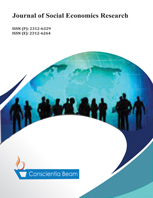Analysis of the Effects of Pull and Push Factors on Brain Drain: An Example of Turkey
DOI:
https://doi.org/10.18488/journal.35.2019.62.74.84Abstract
Unemployment remains a major social problem with the impact of economic, social, political, historical and cultural factors. This problem is not only limited to Turkey but also becomes a global threat to other countries. Unemployment cannot be considered separately from employment. Unlike unemployment, employment policies are the process of inclusion of the labor element in the labor market. The most basic problem of unemployment and employment in Turkey; it is artificial employment and poverty rather than open unemployment in the western sense. On the other hand; frequent economic crises have led to the loss of employees' jobs. As a matter of fact, after the last crises, approximately 10 out of every 100 people, who are called as a qualified, highly educated gold collar, lost their jobs and the official unemployment rate increased from 9% to 12%. The most affected sectors are unemployed; while banking and finance and industry and service sectors are stated, there is a marked decrease in the quality of life of individuals. Another important development that attracts attention with the increasingly difficult working conditions and the economic crises is the increase of brain drain. Undoubtedly, it is possible to say that the unemployment phenomenon and the decrease in the quality of life have a significant effect on these negative developments. In this study, the reasons for going abroad and their decision to return to the country of the qualified labor force will be evaluated by logistic regression analysis in terms of pull and push factors.

